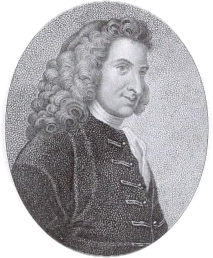“Hemos de comer para vivir, y vivir para comer.”
Fuente: "The Miser" (El avaro de Fielding), 1733. Acto III, escena III.
Henry Fielding fue un novelista y dramaturgo inglés, conocido por sus escritos satíricos y humorísticos. Está considerado como el creador de la tradición novelística inglesa junto con su contemporáneo Samuel Richardson. Wikipedia

“Hemos de comer para vivir, y vivir para comer.”
Fuente: "The Miser" (El avaro de Fielding), 1733. Acto III, escena III.
Fuente: "Tom Jones", 1749. Libro II, Cap. IX
Fuente: "Tom Jones", 1749. Libro V, Cap. I
Fuente: "Tom Jones", 1749. Libro I, Cap.I
Fuente: "Tom Jones", 1749. Libro I, Cap.I
“Se suele decir que no es la muerte, sino morirse, lo que es terrible.”
Fuente: "Amelia", 1751. Libro III, Cap. IV
Fuente: "Tom Jones", 1749. Libro II, Cap. X
“Un penique ahorrado es un penique ganado.”
Frase proverbial atribuida tradicionalmente a Benjamin Franklin, pero dicha por Fielding en "The Miser" (1733), acto III, escena XII.
“They are the affectation of affectation.”
Book III, Ch. 3
Joseph Andrews (1742)
“The only source of the true Ridiculous (as it appears to me) is affectation”
Author's Preface
Joseph Andrews (1742)
“Love and scandal are the best sweeteneers of tea.”
Act IV, sc. xi
Love in Several Masques (1728)
“It is much easier to make good men wise, than to make bad men good.”
Fuente: The History of Tom Jones, a Foundling
“Some folks rail against other folks, because other folks have what some folks would be glad of.”
Book IV, Ch. 6
Joseph Andrews (1742)
“Money is the fruit of evil as often as the root of it.”
Don Quixote in England (1731), Act I, scene vi http://books.google.com/books?id=8_VbAAAAQAAJ&q=%22Money+is+the+fruit+of+evil+as+often+as+the+root+of+it%22&pg=PA13#v=onepage
“I describe not men, but manners; not an individual, but a species.”
Book III, Ch. 1
Joseph Andrews (1742)
“No one hath seen beauty in its highest lustre who hath never seen it in distress.”
Fuente: Tom Jones
Fuente: The History of Tom Jones, a Foundling
Fielding, Henry; ed. by William Ernest Henley. 1903. The Complete Works of Henry Fielding, Esq: Miscellaneous writings. W. Heinemann. p. 162
“Guilt has very quick ears to an accusation.”
Book III, ch. 11
Amelia (1751)
Abraham Adams, speaking of his host, Wilson.
Book III, Ch. 5
Joseph Andrews (1742)
“To whom nothing is given, of him can nothing be required.”
Book II, Ch. 8
Joseph Andrews (1742)
Book V, Ch. 10
The History of Tom Jones (1749)
“Oh, the roast beef of England,
And old England's roast beef!”
The Grub Street Opera (1731), Act iii, scene 2; reported in Bartlett's Familiar Quotations, 10th ed. (1919)
“Oons, sir! do you say that I am drunk? I say, sir, that I am as sober as a judge.”
Don Quixote in England (1731), Act III, scene xiv
“One fool at least in every married couple.”
Book IX, ch. 4
Amelia (1751)
“This story will not go down.”
Tumble-down Dick; reported in Bartlett's Familiar Quotations, 10th ed. (1919)
“Can any man have a higher notion of the rule of right and the eternal fitness of things?”
Book IV, Ch. 4
The History of Tom Jones (1749)
Book I, Chapter 1
The History of Tom Jones (1749)
“When children are doing nothing, they are doing mischief.”
Book XV, Ch. 2
The History of Tom Jones (1749)
Book V, ch. 1
The History of Tom Jones (1749)
Book I, Chapter 1
The History of Tom Jones (1749)